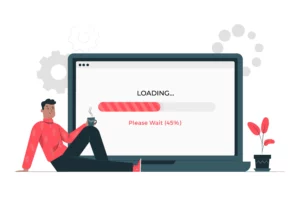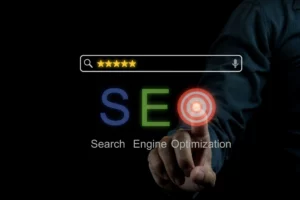Introduction: why maintenance is not a one-time task
When a company sets new website or app, it often seems like the job is done. But the truth is, that's just the beginning. Just like a car needs regular maintenance, a website requires constant care and adjustment. Without maintenance, it can lead to security holes, slow performance, or even a complete site outage.
Website maintenance means:
- regular updates of systems and libraries (e.g. WordPress plugins, Node.js packages, Vue.js components),
- fixing errors that appear over time or after updates,
- adapting to changes in browsers and operating systems,
- monitoring speeds, security and reliability.
For a company, a website is often the main sales channel or even the foundation of its business. Therefore, ensuring its flawless operation is a long-term investment, not a one-time expense.

Safety first
One of the biggest dangers of a neglected website is securityWithout regular updates, a site becomes vulnerable to malicious attacks. Statistics show that the vast majority of hacks are the result of outdated systems and plugins.
Regular maintenance includes:
- CMS updates (e.g. WordPress), libraries in JavaScript/Node.js environment and frontend frameworks such as Vue.js,
- security patches that address known vulnerabilities,
- protection against attacks such as SQL injection, XSS or brute-force logins,
- regular checking of SSL certificates and secure communication via REST APIs.
Without a secure system, a company can lose data, expose sensitive customer information, and even damage its brand.
Speed and performance optimization

Users today expect a website to load in seconds. If it’s slow, they’ll quickly abandon it – which means lost potential customers and lower SEO rankings.
Regular maintenance therefore includes speed optimization, such as:
- image compression and optimization,
- use caching (caching) and CDN service,
- code optimization in JavaScript and frontend components in Vue.js,
- improving backend logic in Node.jsto process data faster and more efficiently.
Google PageSpeed Insights and similar tools regularly check how optimized a site is. With ongoing maintenance, a company can ensure that the site remains competitive in terms of speed.
Regular backups
No matter how well your website is protected, accidents happen – from technical errors to hacks. That’s why regular backups are a key element of maintenance.
Why backups are important:
- enable quick page recovery after an attack,
- protect against data loss due to code errors or updates,
- they protect the company from costs and downtime that could last for days.
The best practice is to have automated backups: daily for dynamic sites (e.g. e-commerce), weekly for less demanding ones. Copies are kept on a separate server or in the cloud so that they are accessible even in case of problems with the main server.
Updates and compatibility
The world of web technologies is evolving rapidly. If a site remains on outdated versions, it risks not only security issues but also incompatibility.
Regular maintenance includes:
- updates CMS and plugins, which add new functionalities and security fixes,
- updates to libraries in the environment Node.js and frontend frameworks such as Vue.js,
- testing after updates to ensure that the system is working without errors,
- adapting to changes in browsers and mobile devices.
Without ongoing maintenance, a company can quickly run into problems: features stop working, pages don't display properly, or the user experience is inconsistent across devices.
SEO benefits of regular maintenance

Website maintenance is not only important for security and performance, but also for SEO optimizationSearch engines like Google reward sites that are fast, secure, and up-to-date.
Regular maintenance contributes to SEO in several ways:
- Page loading speed: optimizing code, images, and caching impacts better rankings.
- Fixing broken links: Broken links are a sign of a neglected page and negatively affect SEO.
- Up-to-date content: Google prefers pages that are regularly updated and offer relevant information.
- Technical SEO: correct meta tags, title structure, friendly URLs, and secure HTTPS communication are part of the maintenance process.
With regular CMS updates, Node.js packages and Vue.js components ensure that the site remains compliant with modern SEO standards.
The cost of neglecting maintenance
Many companies consider maintenance an additional expense, but neglecting it quickly proves to be a more costly mistake.
Possible consequences are:
- Security incidents: hacking, data loss, misuse of sensitive information.
- Page downtime: slow loading or downtime, which means lost customers and revenue.
- Poor SEO ranking: Google penalizes slow and outdated pages.
- Bad reputation: users lose trust in a company if the site is unstable or looks unprofessional.
In practice, a company can prevent damage that would otherwise be measured in thousands with a few hundred euros per year for maintenance.
How to choose a maintenance provider
Choosing the right website maintenance partner is key to long-term success. The provider must have technical expertise, responsiveness, and clearly defined services.
What to watch out for:
- Scope of services: whether maintenance includes security updates, backups, speed monitoring, and SEO optimization.
- Technology support: does the provider master the technologies used by your site – e.g. WordPress, Node.js, Vue.js or more complex integrations via REST API.
- Responsiveness: quick help in case of problems is crucial, as even a few hours of downtime can mean loss of revenue.
- Transparency: clear packages and regular reports on completed maintenance tasks.
A good maintenance partner acts as extended company deadline and ensures that your website is always ready for visitors and business opportunities.
Conclusion
Website maintenance is not a luxury, but a necessity. Without regular care, a website quickly becomes slow, vulnerable, and unattractive to users. With regular updates, backups, speed optimization, and SEO support, a company not only prevents problems, but also provides a competitive advantage.
Maintenance costs are negligible compared to the damage that can be caused by a hack, data loss or site downtime. Therefore, professional maintenance is a long-term investment in security, stability and growth of your business.

